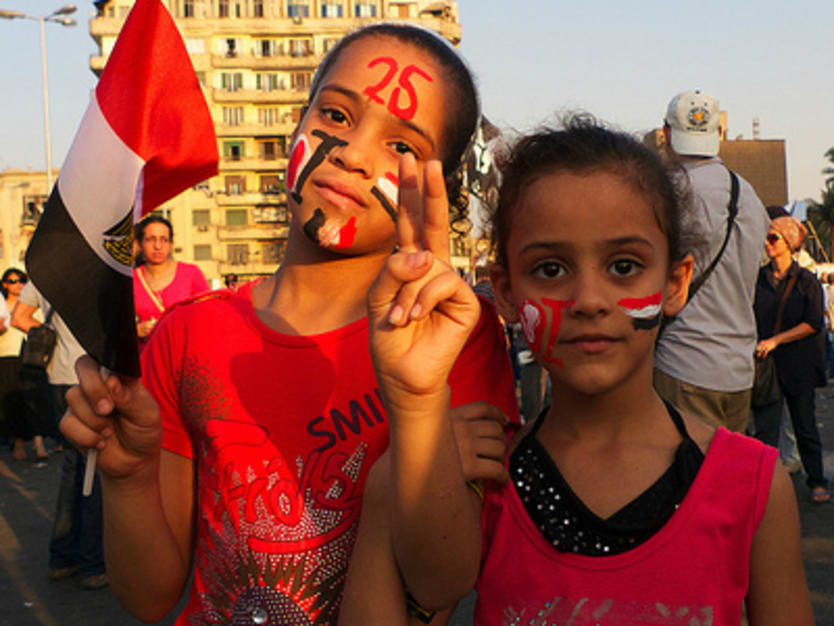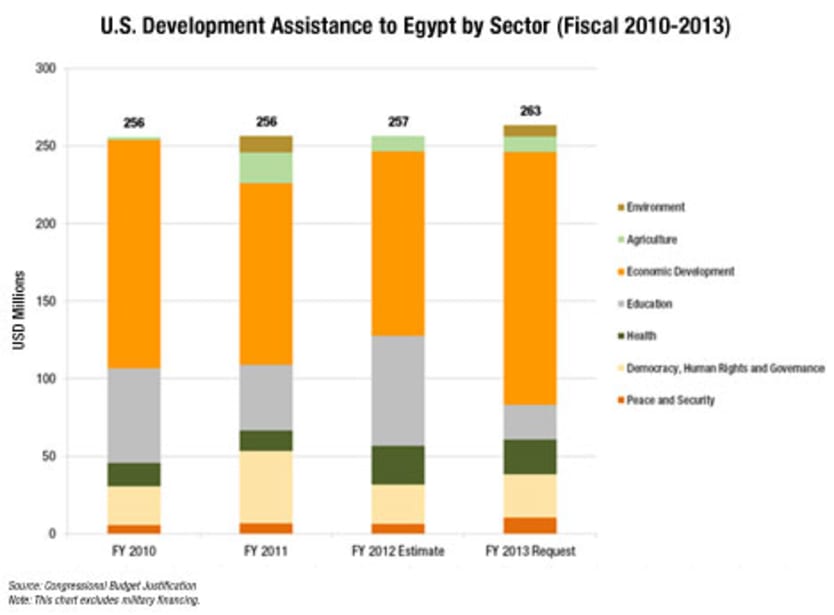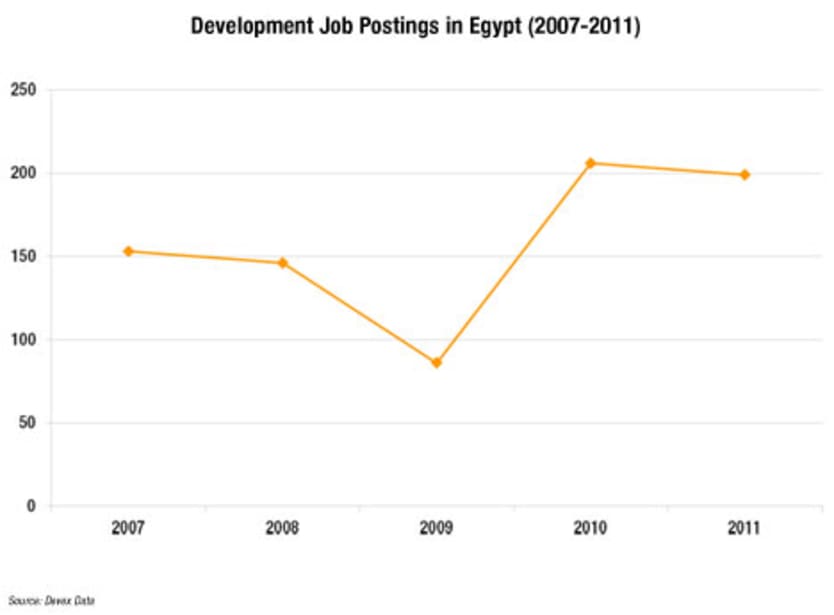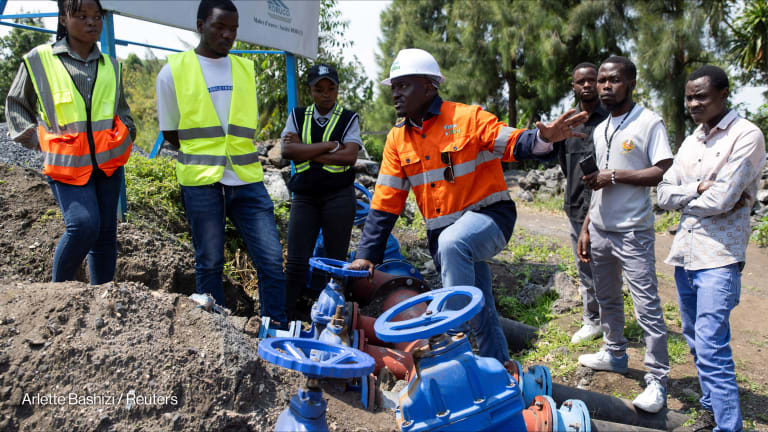
“Despite all the chaos and all the disturbances going on, I believe the future is for us, for the young people,” Egyptian human rights activist and blogger Dalia Ziada told Devex last summer.
Ziada was among the tens of thousands that converged upon Cairo’s Tahrir Square only months before. In the aftermath of Hosni Mubarak’s removal from power, nearly 90 percent of Egyptians believed that his ouster would leave their country better off.
Yet since the revolution, a period of prolonged political and economic uncertainty has tempered these high hopes. For months, the Muslim Brotherhood and the Egyptian military have been locked in a bitter and volatile struggle for power. In a widely unexpected move that appears to have consolidated his authority, on August 12, Egyptian President Mohammed Morsi of the Brotherhood purged the army’s top brass and revoked a military order curtailing his powers. Morsi has also assumed the right to appoint who will draft Egypt’s constitution.
Meanwhile, Egypt’s foreign reserves have dipped to dangerous levels as the rocky transition to civilian rule continues to frighten away tourists and investors. Against this backdrop, GDP growth fell from 5 percent in 2010 to 2 percent in 2011, its lowest level in nearly a decade. Economists say that growth must pick up pace to 6 percent annually to create enough jobs for Egypt’s fast-growing young population. One in four young Egyptians are currently out of work.
Morsi, who in June narrowly defeated the Mubarak regime’s last prime minister to win the presidency, has promised to turnaround the country’s economy. Drawing a contrast with Mubarak, Egypt’s first democratically elected president has emphasized that future growth in the Arab world’s second-largest economy must be both broad-based and equitable.
“We will work together to encourage investment in all sectors and restore tourism to its place, bringing benefit to the Egyptian economy and all citizens in Egypt,” said Morsi in his first public address as president.
Even as market-oriented reforms spurred robust growth during Mubarak’s final years in office, the proportion of Egyptians in poverty actually rose steadily to 25 percent in 2011, according to government figures. Polls show that the country’s uneven economic expansion helped fuel the protest movement that would eventually topple Mubarak.
With Cairo’s coffers increasingly depleted, predictable and sustained aid from foreign donors will be critical to turning the page on Egypt’s development. In 2010, Egypt’s official development assistance to gross national income ratio stood at 0.3 percent, on par with countries including the Philippines and South Africa.
“Egypt needs pretty serious aid in quite a number of different sectors,” says Project on Middle East Democracy Executive Director Stephen McInerney in an interview with Devex, naming health and education among key areas of investment for donors.
McInerney, a member of the bipartisan Egypt Working Group which includes prominent policymakers and thinkers on U.S.-Egypt relations, also asserts, “There’s a threat of a real economic collapse in Egypt and that would be more likely if serious aid is not given to relieve their budget and foreign reserve issues.”
This week, the Egyptian government is expected to seek a higher-than-anticipated $4.8 billion loan from the International Monetary Fund when the emergency lender’s managing director Christine Lagarde visits Cairo. Analysts say that a deal with the IMF would not only alleviate Egypt’s budgetary crisis, but also send a signal to foreign investors that Egypt is again open for business.
Economic development, a priority for U.S. nonmilitary aid
While there has been a lot of talk about U.S. military assistance to Egypt, there has been little critical examination of American civilian aid to the post-Mubarak government. Since its 1979 peace treaty with Israel, the United States has been the leading donor to Egypt and the country has been the second-largest recipient of U.S. foreign aid. On Tuesday, Egyptian Finance Minister Mumtaz al-Saeed requested $500 million in budget support from the United States. A key strategic partner of Washington, Egypt is among a handful of countries where the U.S. Congress has previously authorized direct budget support.
In a bid to maintain the U.S. strategic partnership with Egypt – where the armed forces have historically commanded the levers of power behind the scenes – succeeding administrations have set aside the bulk of U.S. foreign assistance to financing the Egyptian military. Since President Barack Obama took office in 2009, the administration has budgeted $1.3 billion in military assistance to Egypt each year, compared to roughly $250 million annually for U.S. development aid.
Amid signs that Egypt’s transition to democracy has begun to erode the military’s influence, proposals to rebalance the U.S. aid relationship with Cairo have, thus far, gained little traction. Following an escalation of violence in the Sinai Peninsula earlier this month, the New York Times reported that U.S. and Egyptian officials have stepped up talks on enhancing military cooperation between the two countries.
The transitional Egyptian government’s crackdown against foreign-funded democracy groups, including four U.S.-based nongovernmental organizations, had led some Congressional leaders to warn of cutbacks to U.S. aid to Egypt. Nonetheless, most analysts agree that U.S. strategic imperatives, which include maintaining Cairo’s role as mediator in the Arab-Israeli peace process, as well as securing continued access to the Suez Canal, will likely keep both U.S. military and development aid to Egypt intact for the foreseeable future. According to McInerney, the “default expectation” in Washington is that U.S. development assistance to Egypt will remain at about $250 million each year.
While U.S. aid programming in Egypt spans a wide range of sectors, supporting the country’s economic development has emerged as a particular priority for the Obama administration (see chart). The administration underscores that its economic development programming aims to kick-start job creation in the private sector. Approximately 70 percent of Egypt’s workforce, both in the formal and informal economies, is employed by the private sector.

Click here to view image in large size
Within weeks of Mubarak’s ouster, in March 2011, the U.S. Agency for International Development issued an annual program statement inviting applications for grants to design and implement programming to help facilitate Egypt’s economic transition. Of the $100 million total in grants, $75 million would support economic growth and job creation programming.
In a May 2011 address at the State Department, Obama announced a host of initiatives to promote the development of Egypt’s private sector, part of a broader aid package for the Middle East and North Africa. These initiatives, which have been largely backed by Congress, include: (1) $1 billion in loan guarantees to finance job creation and infrastructure in Egypt, (2) enterprise funds to support Egyptian small- and medium-sized businesses, and (3) $1 billion in debt relief to Egypt attached to a commitment by the administration to work with Cairo to invest these resources to foster growth and entrepreneurship.
As outlined in its economic and social program called al-Nahda, Egypt’s new Muslim Brotherhood-led government acknowledges the need to bolster the private sector to revitalize Egypt’s economy.
“The Egyptian economy must rely to a very, very large degree on the private sector. The priority is for Egyptian investors, then Arab then foreign,” Muslim Brotherhood Deputy Leader Khairat al-Shater, who preceded Morsi as the Islamist movement’s presidential candidate, recently told Reuters.
European and Arab donors also pledge support for transition
In line with the Deauville Partnership, a joint commitment by the international community to support Egypt’s transition, European and Arab bilateral donors have also pledged to strengthen their development partnerships with Cairo. In 2011, France announced €650 million ($801 million) in foreign assistance to Egypt through 2013 – well above aid pledges from its EU peers including Germany and the United Kingdom. The administration of newly-elected President Francois Hollande has since reaffirmed this commitment, adding that Morsi’s election will likely accelerate disbursements for the French aid program in Egypt. Early this year, France earmarked 300 million euros of its 650 million-euro aid commitment to extend Cairo’s metro system.
Meanwhile, last year, Riyadh pledged long-term loans and grants worth $4 billion to Cairo. However, Saudi Arabia’s detention of an Egyptian human rights activist has recently soured bilateral relations between Riyadh and Cairo, raising questions over the status of the oil-rich kingdom’s aid commitment. In an attempt to mend fences, Morsi made his first foreign visit to Saudi Arabia. Qatar, Kuwait and the United Arab Emirates have each pledged aid to Egypt running into the billions of dollars.
Obama has also announced that the U.S. will work with its fellow shareholders at the European Bank for Reconstruction and Development to refocus the EBRD’s efforts on supporting democratic transitions and economic modernization in the Middle East and North Africa. The United States is the largest shareholder of the bank. Since its founding in 1991, the EBRD has been widely credited with fostering private sector development in Eastern European countries transitioning from command to market economies.
“The economic reforms and technical assistance required by Egypt in the coming months and years are exactly what the EBRD specializes in providing,” argues a November 2011 report by the Bipartisan Policy Center, a Washington think-tank.
In May 2012, EBRD signed off on a 1 billion-euro special fund to start investments in Egypt, Morocco, Tunisia and Jordan. And in late July, the bank issued a tender for consultancy services on expanding access to finance for small- and medium-sized enterprises in Egypt.
The EBRD joins the ranks of multilateral donors already on the ground in Egypt. Only last month, Cairo signed a $1 billion loan agreement with a subsidiary of the Islamic Development Bank, part of a three-year $2.5 billion commitment to Egypt by the IsDB. In May 2011, then World Bank President Robert Zoellick announced that the largest of the multilateral lenders would make available up to $4.5 billion in aid to Egypt over 24 months. That same year, the European Investment Bank and the African Development Bank each pledged some $1.5 billion in lending. Finally, the European Commission has budgeted 449 million euros for its Egypt programming from 2011-13.
For implementers, NGO crackdown leaves chilling effect
Early this month, Morsi swore in his first cabinet as president. The democracy promotion community heaved a collective sigh of relief as it became clear that Fayza Abul-Naga would not be returning to government. As Egypt’s Minister of Planning and International Cooperation, the holdover from the Mubarak regime spearheaded a clampdown on foreign-funded democracy groups which culminated in the filing of charges against 43 employees of U.S. and German NGOs, including 19 Americans.
While Abul-Naga’s departure from the government signals that the worst of the crackdown may be over, its chilling effect on implementers, including groups that do not engage in democracy programming, lingers on.
“Currently, there is a certain amount of trepidation in the development community fueled by the ex-minister of Planning and Cooperation and her public statements. While directed at democracy and governance and human rights implementers, the fallout has affected all implementers,” observes Gevorg Adamyan, a managing director at ACDI/VOCA who oversees the U.S.-based NGO’s agribusiness practice, including in Egypt.
Lamenting a spike in anti-American sentiment since the revolution, Adamyan nonetheless asserted to Devex, “We simply stick to our work and ignore it.”
Devex jobs data suggests that most implementers in Egypt have indeed pressed ahead, likely with a lower profile. Devex has recorded only a slight drop in the number of development job openings in Egypt, from 206 jobs posted in 2010 to 199 in 2011 (see chart). Even as Abul-Naga’s crackdown on democracy groups intensified during the first half of this year, Devex recorded 104 job postings in Egypt over the same period.

Click here to view image in large size
As USAID and other aid agencies encourage implementers to reach out to local civil society, McInerney cautions that international aid groups –especially democracy promoters – should continue to tread carefully when pursuing engagement with Egyptian development groups.
“There’s sort of this uncertain moment where people are still wary of being targeted for having foreign ties,” says McInerney.
Lorenzo Piccio contributed to this report.
Read more:








